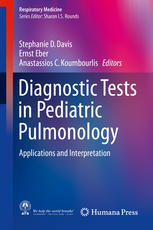

Most ebook files are in PDF format, so you can easily read them using various software such as Foxit Reader or directly on the Google Chrome browser.
Some ebook files are released by publishers in other formats such as .awz, .mobi, .epub, .fb2, etc. You may need to install specific software to read these formats on mobile/PC, such as Calibre.
Please read the tutorial at this link: https://ebookbell.com/faq
We offer FREE conversion to the popular formats you request; however, this may take some time. Therefore, right after payment, please email us, and we will try to provide the service as quickly as possible.
For some exceptional file formats or broken links (if any), please refrain from opening any disputes. Instead, email us first, and we will try to assist within a maximum of 6 hours.
EbookBell Team

4.4
22 reviewsOver the past 20 years, diagnostic tests for pediatric pulmonologists have revolutionized care of children afflicted with respiratory disorders. These tests have been used to not only help in diagnosis, but also in the management and treatment of these children. Bronchoscopic, imaging and physiologic advances have improved clinical care of these children and have been used as outcome measures in research trials. Diagnostic Tests in Pediatric Pulmonology: Applications and Interpretation describes the various diagnostic modalities (especially the newer ones) that are available for the evaluation of pediatric respiratory disorders. It also provides an understanding of the advantages and limitations of each test so that the clinician may choose the most appropriate ones. An internationally renowned group of authors describe how best to interpret the key findings in a variety of tests as well as the possible pitfalls in incorrect interpretation. This volume focuses on the main diagnostic modalities used in the evaluation of pediatric patients with respiratory disorders and presents up-to-date information on the advantages and limitations of each test for a variety of conditions encountered in the practice of pediatric pulmonology. Clinical utility of these tests is also highlighted. This valuable resource is well suited to practicing clinicians, including pediatric pulmonologists, pediatricians and primary care practitioners, as well as trainees, respiratory therapists and clinical researchers.